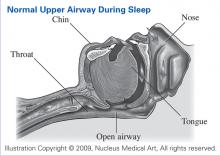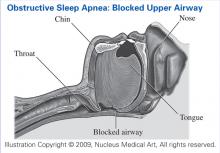Sidebar to the article Sleep Deprivation: What Does It Mean for Public Safety Officers? by Bryan Vila, Ph.D.
"Apnea" refers to a breathing pause that lasts at least 10 seconds. Obstructive sleep apnea occurs when the muscles in the back of the throat fail to keep the airway open, despite efforts to breathe.
More than 18 million American adults have sleep apnea, according to the Sleep Foundation. Ongoing sleep research involving police officers is expected to give us a better understanding of the situation among this group.
Symptoms: Snoring during sleep, drowsiness and fatigue during awake times, difficulty concentrating, depression, irritability, sexual dysfunction, learning and memory difficulties.
Consequences: High blood pressure, heart attack, stroke, depression and car crashes.
Risk factors: Being overweight, being older than 40 years of age, having a large neck size (for men, a large neck size is 17 or larger), smoking cigarettes and using alcohol. Research seems to indicate that apnea runs in families.
Treatment: The most common treatment is the use of a continuous positive airway pressure device mask worn during sleep. Some cases may be treated with a dental appliance. Lifestyle changes can also be highly effective: lose weight, avoid alcohol and quit smoking.
Learn more at www.sleepfoundation.org.
About This Article
This article appeared in NIJ Journal Issue 262, March 2009, as a sidebar to the article Sleep Deprivation: What Does It Mean for Public Safety Officers? by Bryan Vila, Ph.D.



